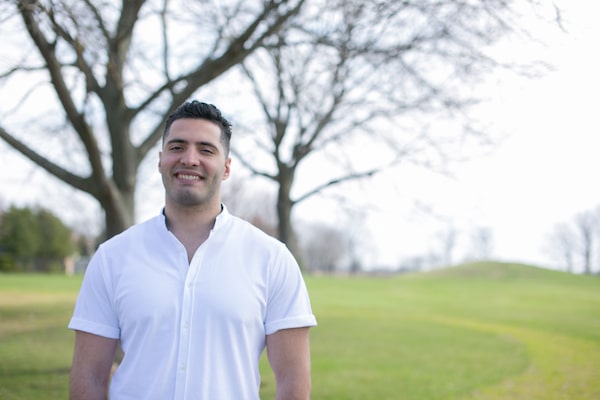
Jessie GrewalDarryl Dick / Vancouver
One of several programs offered by MS Society of Canada to help those living with the disease
Jessie Grewal, 21, and Michael Cruz, 26, live across the country from each other, and they have never met in person. But over the past 10 months, Jessie and Michael have formed an indelible bond through communications sent by e-mail. The two connected because they share something in common – both live with multiple sclerosis (MS).
Jessie, who lives in Vancouver, was diagnosed with MS in January of 2018. And though her loved ones were supportive, she soon realized she needed someone to talk to who could truly understand what she was going through.
“I just didn’t feel like everyone else. I felt like, ‘I have MS, I’m different, I won’t be able to do what everyone around me is able to do,’” she says. “Being told I have a disease and I will have it forever – it was hard for me to come to terms with that and accept it.”
MS is classified as an autoimmune disease of the central nervous system which can cause symptoms such as fatigue, lack of coordination, weakness, impaired sensation, vision problems, bladder problems, and cognitive and mood changes.
Jessie heard about the MS Society of Canada’s 1:1 Peer Support Program through her healthcare provider, so she decided to give it a chance. She was connected with Michael, who lives in Brantford, Ont.
Michael, who was diagnosed in 2014, says he got involved in the program last year because of his own experiences navigating the disease at the age of 21.

Michael CruzGlenn Lowson / Branford
“I had a good support system, but I didn’t know anybody who also had MS,” Michael says. “I thought to myself, ‘It would have been nice to have someone to talk to back in 2014,’ so I wanted to provide that for others like Jessie. To let people know they’re not alone.”
The two communicate by e-mail once every three or four weeks, sharing their experiences, their challenges and their strategies for living with MS.
“If I’m helping Jessie to stay positive, it’s also reinforcing that for myself to remember to stay positive,” he says.
As for Jessie, she says the insight and support she’s received from Michael have changed her life.
“It’s one of the best things that has happened to me since being diagnosed with MS, and everyone around me has noticed that my energy and my attitude have completely changed. Having someone to talk to who can relate – it makes a big, big difference.”
The 1:1 Peer Support Program is just one of the many services referred through the MS Knowledge Network, a national program launched by the MS Society of Canada in 2016 that provides current, reliable information and support to people through a team of MS navigators.
Sheryl Harding is a navigator with the MS Knowledge Network, and she says the 1:1 Peer Support Program can be a valuable source of support for people living with MS, their loved ones and caregivers.
Because MS can be an “invisible disease,” Sheryl says, people with MS are often looking for someone who can relate to the challenges they face.
“The general public may not see that a person has brain fog or fatigue or cognitive change [owing to MS],” she says. “And with MS, you often don’t know how it [will progress], so newly diagnosed people are often looking for positive things to look forward to in the future. They may be choosing to try a certain disease-modifying therapy and they’ll be looking for support around those kinds of choices.”
As a navigator for the MS Knowledge Network, Sheryl spends much of her day on the phone providing information to people living with MS and their families. She says it’s a particularly important resource for people who live in rural or remote communities, where there aren’t many services for people with MS.
It’s one of the best things that has happened to me since being diagnosed with MS, and everyone around me has noticed that my energy and my attitude have completely changed. Having someone to talk to who can relate – it makes a big, big difference.
— Jessie Grewal
The MS Knowledge Network has a wealth of resources its navigators can draw from, including information about MS treatment options to regional programs to current research and clinical trials. People also call in to find healthcare professionals in their area, such as physiotherapists, occupational therapists and nutritionists, Sheryl says. And sometimes, they just want to talk.
“We all have a background in fields like social work or client services and we’ve also had specific training to work with people who are in distress,” she says. “There are also issues around financial challenges – we provide a lot of information about financial supports.”
Above all, Sheryl says that callers living with MS and their families are looking for hope and a sense of security about their future.
Michael, too, is committed to communicating a message of hope to the people he connects with through the 1:1 Peer Support Program. In addition to Jessie, he works with four other people with MS.
“They need to know that they can live a normal, beautiful, long life with MS,” he says. “I’m married, I have two kids, I don’t allow it to stop me from anything. You can have a wonderful life.”
Find more information about the MS Knowledge Network at https://mssociety.ca/support-services/ms-knowledge-network
Advertising feature produced by Globe Content Studio. The Globe’s editorial department was not involved.